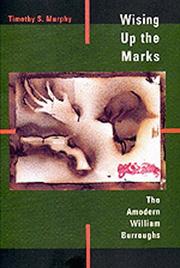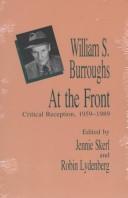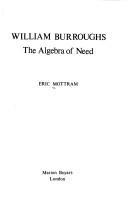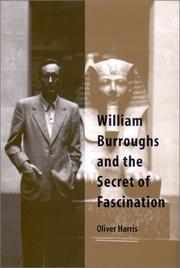| Listing 1 - 10 of 10 |
Sort by
|

ISBN: 0520209508 0520209516 0520919408 0585261636 9780520919402 9780585261638 9780520209503 9780520209510 Year: 1997 Publisher: Berkeley, Calif. University of California Press
Abstract | Keywords | Export | Availability | Bookmark
 Loading...
Loading...Choose an application
- Reference Manager
- EndNote
- RefWorks (Direct export to RefWorks)
William S. Burroughs is one of the twentieth century's most visible, controversial, and baffling literary figures. In the first comprehensive study of the writer, Timothy S. Murphy places Burroughs in the company of the most significant intellectual minds of our time. In doing so, he gives us an immensely readable and convincing account of a man whose achievements continue to have a major influence on American art and culture. Murphy draws on the work of such philosophers as Gilles Deleuze, Félix Guattari, Theodor Adorno, and Jean-Paul Sartre, and also investigates the historical contexts from which Burroughs's writings arose.From the paranoid isolationism of the Cold War through the countercultural activism of the sixties to the resurgence of corporate and state control in the eighties, Burroughs's novels, films, and music hold a mirror to the American psyche. Murphy coins the term "amodernism" as a way to describe Burroughs's contested relationship to the canon while acknowledging the writer's explicit desire for a destruction of such systems of classification. Despite the popular mythology that surrounds Burroughs, his work has been largely excluded from the academy of American letters. Finally here is a book that presents a solid portrait of a major artistic innovator, a writer who combines aesthetics and politics and who can perform as anthropologist, social goad, or media icon, all with consummate skill.
Burroughs, William S. --- American Literature --- English --- Languages & Literatures --- Burroughs, William Seward --- Criticism and interpretation --- Burroughs, William S., --- Criticism and interpretation. --- Burroughs, William --- Lee, Willy --- Lee, William --- Baroouz, Ouiliam --- Berrouz, Uilʹi︠a︡m

ISBN: 058503950X 9780585039503 0809315858 0809315866 9780809315857 9780809315864 Year: 1991 Publisher: Carbondale Southern Illinois University Press
Abstract | Keywords | Export | Availability | Bookmark
 Loading...
Loading...Choose an application
- Reference Manager
- EndNote
- RefWorks (Direct export to RefWorks)
Beat literature --- Literature --- History and criticism. --- Burroughs, William S., --- Burroughs, William S. --- Burroughs, William --- Lee, Willy --- Lee, William --- Baroouz, Ouiliam --- Berrouz, Uilʹi︠a︡m --- Criticism and interpretation. --- Burroughs, William Seward --- Criticism and interpretation

ISBN: 0714525626 9780714525624 Year: 1977 Publisher: London Boyars
Abstract | Keywords | Export | Availability | Bookmark
 Loading...
Loading...Choose an application
- Reference Manager
- EndNote
- RefWorks (Direct export to RefWorks)
Burroughs, William S. --- Beat generation --- Burroughs, William S., --- Criticism and interpretation --- Beatniks --- Beats --- American literature --- Bohemianism --- -Criticism and interpretation --- Persons --- Burroughs, William, --- Lee, Willy, --- Lee, William, --- Baroouz, Ouiliam, --- Berrouz, Uilʹi︠a︡m, --- Criticism and interpretation. --- Beats (Persons) --- Burroughs, William Seward --- Burroughs, William --- Lee, Willy --- Lee, William --- Baroouz, Ouiliam --- Berrouz, Uilʹi︠a︡m --- Burroughs, William S., - 1914-1997 - Criticism and interpretation --- Burroughs (william s.) --- Burroughs, William S., - 1914-1997

ISBN: 1849644853 1281725463 9786611725464 1435661281 9781435661288 9781849644853 6611725466 0745320821 9780745320823 0745320813 9780745320816 9781281725462 Year: 2004 Publisher: London Sterling Pluto Press
Abstract | Keywords | Export | Availability | Bookmark
 Loading...
Loading...Choose an application
- Reference Manager
- EndNote
- RefWorks (Direct export to RefWorks)
Homosexuality and literature --- Sexual orientation in literature. --- Beats (Persons) in literature. --- Drug addiction in literature. --- Narcotic habit in literature --- Beat generation in literature --- History --- Burroughs, William S., --- Burroughs, William S. --- Burroughs, William --- Lee, Willy --- Lee, William --- Baroouz, Ouiliam --- Berrouz, Uilʹi︠a︡m --- Criticism and interpretation. --- Beat generation in literature. --- Burroughs, William Seward --- Criticism and interpretation --- United States --- 20th century --- Sexual orientation in literature

ISBN: 1429417595 9781429417594 0809324849 9780809324842 Year: 2003 Publisher: Carbondale Southern Illinois University Press
Abstract | Keywords | Export | Availability | Bookmark
 Loading...
Loading...Choose an application
- Reference Manager
- EndNote
- RefWorks (Direct export to RefWorks)
Beat literature --- Homosexuality and literature --- Sexual orientation in literature. --- Drug addiction in literature. --- American Literature --- English --- Languages & Literatures --- Narcotic habit in literature --- Literature --- History and criticism. --- History --- Burroughs, William S., --- Burroughs, William S. --- Burroughs, William --- Lee, Willy --- Lee, William --- Baroouz, Ouiliam --- Berrouz, Uilʹi︠a︡m --- Criticism and interpretation. --- Beat generation in literature.
Book
ISBN: 1283123223 9786613123220 9042033045 9789042033047 9781283123228 9789042033030 9042033037 6613123226 Year: 2011 Publisher: Amsterdam New York Rodopi
Abstract | Keywords | Export | Availability | Bookmark
 Loading...
Loading...Choose an application
- Reference Manager
- EndNote
- RefWorks (Direct export to RefWorks)
Shift Linguals traces a history of the cut-up method, the experimental writing practice discovered by Brion Gysin and made famous by Beat author William S. Burroughs. From the groundbreaking works of Dada and Surrealism that paved the way for Burroughs’ breakthrough, through the countercultural explosion of the 1960's, Shift Linguals explores the evolution of the cut-ups within the theoretical frameworks of postmodernism and the avant-garde to arrive at the present and the digital age. Some 50 years on from the first ‘discovery’ of the cut-ups in 1959, it is only now that we are truly able to observe the method’s impact, not only on literature, but on music and culture in a broader sense. The result of over nine years of research, this study represents the first sustained and detailed analysis of the cut-ups as a narrative form. With explorations of the works of Burroughs, Gysin, Kathy Acker, and John Giorno, it also contains the first critical writing on the works of Claude Pélieu and Carl Weissner in English, as well as the first in-depth discussion of the writing of Stewart Home to date.
Experimental fiction --- Postmodernism (Literature) --- Experimental fiction. --- Literary movements --- Literature, Modern --- Modernism (Literature) --- Post-postmodernism (Literature) --- Avant-garde fiction --- Fiction --- Literature, Experimental --- History and criticism. --- Burroughs, William S., --- Baroouz, Ouiliam, --- Berrouz, Uilʹi͡am, --- Burroughs, William, --- Lee, William, --- Lee, Willy, --- Burroughs, William S. --- Burroughs, William --- Lee, Willy --- Lee, William --- Baroouz, Ouiliam --- Berrouz, Uilʹi︠a︡m --- Criticism and interpretation.
Book
ISBN: 9401210918 9789401210911 9042038489 9789042038486 9789042038486 Year: 2014 Publisher: Amsterdam Editions Rodopi
Abstract | Keywords | Export | Availability | Bookmark
 Loading...
Loading...Choose an application
- Reference Manager
- EndNote
- RefWorks (Direct export to RefWorks)
William S. Burroughs' experimental narratives, from the 1959 publication of Naked Lunch through the late trilogy of the 1980's, have provided readers with intriguing challenges and, for some, disheartening frustrations. Yet, these novels continue to generate new interest and inspire new insights among an increasing and evolving readership. This book addresses the unique characteristics of Burroughs' narrative style in order to discover strategies for engaging and navigating these demanding novels. Bolton advises, "Burroughs' subversive themes and randomizing techniques do not amount to unmitigated...
Narration (Rhetoric) --- Narrative (Rhetoric) --- Narrative writing --- Rhetoric --- Discourse analysis, Narrative --- Narratees (Rhetoric) --- Burroughs, William S., --- Baroouz, Ouiliam, --- Berrouz, Uilʹi͡am, --- Burroughs, William, --- Lee, William, --- Lee, Willy, --- Burroughs, William S. --- Burroughs, William --- Lee, Willy --- Lee, William --- Baroouz, Ouiliam --- Berrouz, Uilʹi︠a︡m --- Criticism and interpretation. --- Authors, American -- 19th century -- Correspondence. --- Authors, American -- 20th century -- Correspondence. --- Burroughs, William S. -- (William Seward), -- 1914-1997. --- Authors, American
Book
ISBN: 0809334879 9780809334872 9780809334865 0809334860 Year: 2016 Publisher: Carbondale
Abstract | Keywords | Export | Availability | Bookmark
 Loading...
Loading...Choose an application
- Reference Manager
- EndNote
- RefWorks (Direct export to RefWorks)
"So many biographical works exist on the Beat Generation, which are of course important, but scholars tend to neglect the most fascinating aspects of their literary texts. "The Green Ghost" seeks to steer the study of Burroughs and the beats into a new direction entirely by viewing their work through the cultural prism of green cultural studies"--
LITERARY CRITICISM / American / General. --- Ecocriticism. --- Beats (Persons) --- Ecology in literature. --- Beat generation --- Beatniks --- Persons --- Bohemianism --- Ecological literary criticism --- Environmental literary criticism --- Criticism --- Burroughs, William S., --- Burroughs, William S. --- Burroughs, William --- Lee, Willy --- Lee, William --- Baroouz, Ouiliam --- Berrouz, Uilʹi︠a︡m --- Criticism and interpretation --- Beat generation. --- Criticism and interpretation. --- Beats (Persons).
Book
ISBN: 0585321787 9780585321783 0872497984 Year: 1992 Publisher: Columbia : University of South Carolina Press,
Abstract | Keywords | Export | Availability | Bookmark
 Loading...
Loading...Choose an application
- Reference Manager
- EndNote
- RefWorks (Direct export to RefWorks)
Foster provides a survey of the four major Beat writers: Jack Kerouac, Allen Ginsberg, William S. Burroughs, and Gregory Corso. These writers were closely allied from the beginning of their careers and shared a particular vision of America, one which in turn defined much of their most celebrated work. They wrote in opposition to the materialistic, conformist culture they saw developing in postwar America, seeking through their fiction and poetry a way out of that world. Literature, as Foster demonstrates, allowed both writer and reader to see things as they were while, at the same time, providing an entry into transcendent realities. The best-known Beat works, On the Road, "Howl," and Naked Lunch, responded directly to social and political conditions at mid-century while indicating ways to escape them. Although the Beats were widely seen as social revolutionaries by journalists, Kerouac, Ginsberg, Burroughs, and Corso were always predominantly writers. As the United States moved away from the contained, conservative temperament of the postwar period, the Beats became celebrities, and, as such, were dependent for their reputations on newspapers, magazines, and television. Their fame assured that they would be read, yet they were perhaps better known for their values and their personalities than for their books. Confusing the writer with the subject of On the Road, Kerouac's early followers were surprised to find that he did not even like to drive. They failed to see that his real revolution had to do with language. Foster focuses on the problems of language and aesthetics that the Beats confronted and suggests to the reader the great range of influence their work has had on subsequent writers.
Beat literature --- Beats (Persons) --- American literature --- American Literature --- English --- Languages & Literatures --- Beat generation --- Beatniks --- Persons --- Bohemianism --- Literature --- History and criticism. --- History and criticism --- Kerouac, Jack, --- Burroughs, William S., --- Ginsberg, Allen, --- Ginzberg, Alen, --- Gīnasabārga, Ayālena, --- Ginsberg, Irwin Allen, --- גינזברג, אלן --- Burroughs, William S. --- Burroughs, William --- Lee, Willy --- Lee, William --- Baroouz, Ouiliam --- Berrouz, Uilʹi︠a︡m --- Kerouac, Jack --- Kerouac, John --- Kérouac, Jean Louis Lebris de --- Chia-lo-kʻo, Chieh-kʻo --- Keruak, Dz︠h︡ek --- Ḳeruʼaḳ, G'eḳ --- קרואק, ג׳ק, --- Criticism and interpretation. --- United States --- Intellectual life --- 20th century
Book
ISBN: 0070657238 9780070657236 Year: 1976 Publisher: New York (N.Y.): MacGraw-Hill
Abstract | Keywords | Export | Availability | Bookmark
 Loading...
Loading...Choose an application
- Reference Manager
- EndNote
- RefWorks (Direct export to RefWorks)
American literature --- Authors, American --- Beat generation --- Bohemianism --- History and criticism --- Biography --- Burroughs, William S., --- Ginsberg, Allen, --- Kerouac, Jack, --- -Authors, American --- -Beat generation --- -Manners and customs --- Hippies --- Beatniks --- Beats --- American authors --- English literature --- Agrarians (Group of writers) --- United States --- Burroughs, William S. --- Ginsberg, Allen --- Kerouac, Jack --- Beat generation. --- History and criticism. --- Biography. --- -History and criticism --- Persons --- Manners and customs --- -Beats (Persons) --- Ginsberg, Allen. --- Kerouac, John --- Kérouac, Jean Louis Lebris de --- Chia-lo-kʻo, Chieh-kʻo --- Keruak, Dz︠h︡ek --- Ḳeruʼaḳ, G'eḳ --- קרואק, ג׳ק, --- Burroughs, William --- Lee, Willy --- Lee, William --- Baroouz, Ouiliam --- Berrouz, Uilʹi︠a︡m --- -English literature --- -American authors --- American literature - 20th century - History and criticism --- Authors, American - 20th century - Biography --- Bohemianism - United States --- Burroughs, William S., - 1914-1997 --- Ginsberg, Allen, - 1926-1997 --- Kerouac, Jack, - 1922-1969
| Listing 1 - 10 of 10 |
Sort by
|

 Search
Search Feedback
Feedback About UniCat
About UniCat  Help
Help News
News